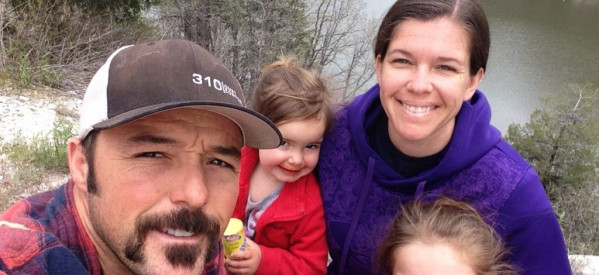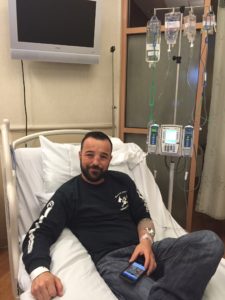On Borrowed Time

Insurance battle continues for area firefighter
By Christina Fuoco-Karasinski
Austin Peck always wanted to be a firefighter. He was sociable as a student at Cave Creek’s Cactus Shadows High School, about the same time his uncle, then a Glendale fire chief, introduced him to the occupation.
“Not to boast, but I was really physical,” says Peck, a Goodyear firefighter. “I’ve been a helpful person my whole life, so it made sense to become a firefighter.”
These days, however, the 33-year-old Peck is spending time having chemotherapy for sinonasal undifferentiated carcinoma, abbreviated SNUC, a rare, aggressive disease in the lining of the sinuses or nose. Peck said he is one of only 400 people who’ve had the cancer. Although there isn’t a lot of research on the cancer, doctors told Peck his disease is from the carcinogens he was exposed to while fighting fires.
Peck was diagnosed in November 2015 after his nose felt swollen, as if it was broken, and he headed to the doctor. He was given an 18-percent chance to live six months.
”At the time, I was boxing. I thought it was just a broken nose,” he says. “I just let it go, but it started to get bigger. I thought I had to check that out. Then I started to get really bad headaches. I went to an ear, nose, and throat doctor in Phoenix. He looked up there with a camera and instantly said there was a tumor in my nose. It was devastating.”
Just after Christmas, he and his wife, Erin, left their daughters, Marley and Harper, with his parents so the kids could finish school while they moved to California for treatment. The Scripps Research Institute in La Jolla offered proton beam radiation that Phoenix’s Mayo Clinic only now possesses. Since then, Peck’s condition has reoccurred when treatment stopped after PET scans were clear. He can no longer have radiation because he met his lifetime limit.
“When this started, I obviously took disability in November 2015,” Peck says. “I did six months of that, had a clear scan and went back on light-duty status. I worked in the admin office for 40 hours a week. I was diagnosed again and went on disability.”
”After that, I had a clear scan. I went back to a modified light-duty status. Two months ago, I went back on the fire truck for a 40-hour work week. Then, the day I was let back on a normal shift, I got an email that the cancer came back.”
Professional Firefighters of Arizona Executive Vice President Joe Hester says, “We’ve seen cancer among our colleagues, but with all the synthetics that have come in to the market, it’s become an epidemic.”
According to the First Responder Center for Excellence, some diseases are considered “presumptive.” Generally, in the case of work-related illness or injury, the burden is placed on the workers to prove their ailments are a result of occupational exposures. With the advent of presumptive legislation, that burden shifts; the employer must prove the firefighter’s working conditions were not a significant contributing factor to the development of cancer. With presumptive legislation, the line-of-duty claim, and subsequent benefits, can be automatically approved if the specific criteria are met under the state’s regulations.
Most states cover firefighters for one or more cancers under workers’ compensation; others, only specific cancers are covered like leukemia, non-Hodgkin’s lymphoma, brain cancer, bladder cancer, and gastrointestinal cancer. Arizona’s coverage is outlined in ARS 23-901.
Peck applied for worker’s compensation through CopperPoint Mutual Insurance Company and was denied because his cancer is not on the presumptive list. “I paid for the insurance at work for 10 years,” he says. “I went through an appeal process where I had to see two of their doctors and their two doctors denied it was caused from work. They had never heard of the cancer nor had an idea what causes it. We appealed it and it was denied again. We’re now on the fourth appeal.”
During one appeal, he brought paperwork for the industrial commission.
“I provided a three-ring binder with the thousands of calls I’ve been on and what I’ve been exposed to,”he says. “The judge asked me which call gave me cancer. “We know the odds ( of getting cancer). We feel like we should be protected by the insurance we’re paying for. We still do the job we’re asked to, then we’re denied when it comes for us when we’re asking for something back? It’s very frustrating.”
Family Bonding
Erin quit her job as a labor nurse to take care of Peck and their daughters.
“She’s been watching the kids and taking me to appointments,” he says. “I’m not taking anything for granted. It’s been a huge financial life change. We were a dual-income household making really good money.
“We are lucky that we haven’t had to go into bankruptcy.” Erin shares his frustration.
“The part that’s heartbreaking in all of this, for us, is we live a very healthy, clean life,” she said. “We ate organic. We had a home garden, with chickens. We had a pretty chemical-free lifestyle. We exercise.”
“We had five doctors write letters and say they believe Austin’s cancer is career driven. The two doctors in the independent medical exam for industrial commission said they couldn’t find anything in the literature that relates firefighting with SNUC. That’s the part that breaks my heart.”
Friends and family have stepped up to help. The Buffalo Chip Saloon and Harold’s, both of which are in Cave Creek, have held fundraisers, and others have set up a GoFundMe page, gofundme.com/ AustinPeck. The site has collected $55,000 of the $75,000 goal, as of June 10.
“I have nothing but positive people in my life because that’s who I surround myself with. The fire department family is huge. There are more than 100 people who work in the city of Goodyear in the fire department. I bet I hear from every single one of them at least once a month.”
Christina Fuoco-Karasinski graduated from a Michigan college in 1990. Now a Valley resident, she has written for rollingstone.com and billboard.com.
Related posts
Leave a Comment
You must be logged in to post a comment.







